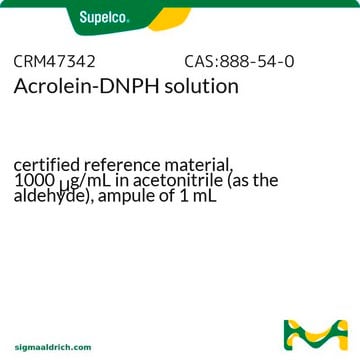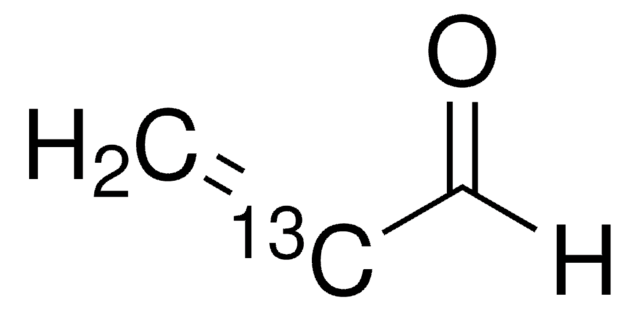133035
Methacrolein
95%
Synonyme(s) :
Methacrylaldehyde
About This Item
Produits recommandés
Densité de vapeur
2.4 (vs air)
Pression de vapeur
121 mmHg ( 20 °C)
13.44 psi ( 55 °C)
5.35 psi ( 20 °C)
Pureté
95%
Forme
liquid
Indice de réfraction
n20/D 1.416 (lit.)
Point d'ébullition
68-70 °C (lit.)
Pf
−81 °C (lit.)
Densité
0.85 g/mL at 25 °C (lit.)
Température de stockage
2-8°C
Chaîne SMILES
[H]C(=O)C(C)=C
InChI
1S/C4H6O/c1-4(2)3-5/h3H,1H2,2H3
Clé InChI
STNJBCKSHOAVAJ-UHFFFAOYSA-N
Vous recherchez des produits similaires ? Visite Guide de comparaison des produits
Catégories apparentées
Description générale
Application
Mention d'avertissement
Danger
Mentions de danger
Classification des risques
Acute Tox. 2 Inhalation - Acute Tox. 3 Dermal - Acute Tox. 3 Oral - Aquatic Acute 1 - Aquatic Chronic 1 - Eye Dam. 1 - Flam. Liq. 2 - Muta. 2 - Skin Corr. 1B
Code de la classe de stockage
3 - Flammable liquids
Classe de danger pour l'eau (WGK)
WGK 3
Point d'éclair (°F)
5.0 °F - closed cup
Point d'éclair (°C)
-15 °C - closed cup
Équipement de protection individuelle
Faceshields, Gloves, Goggles, type ABEK (EN14387) respirator filter
Certificats d'analyse (COA)
Recherchez un Certificats d'analyse (COA) en saisissant le numéro de lot du produit. Les numéros de lot figurent sur l'étiquette du produit après les mots "Lot" ou "Batch".
Déjà en possession de ce produit ?
Retrouvez la documentation relative aux produits que vous avez récemment achetés dans la Bibliothèque de documents.
Les clients ont également consulté
Notre équipe de scientifiques dispose d'une expérience dans tous les secteurs de la recherche, notamment en sciences de la vie, science des matériaux, synthèse chimique, chromatographie, analyse et dans de nombreux autres domaines..
Contacter notre Service technique













